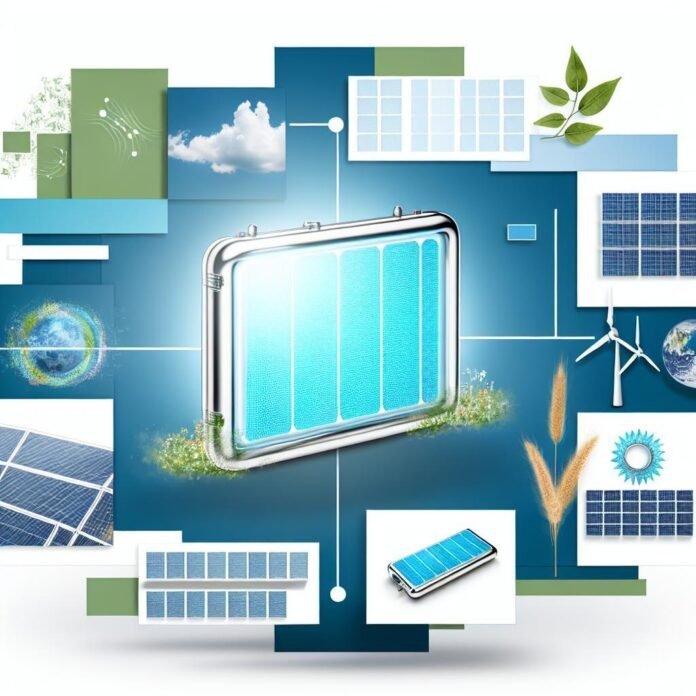As the global demand for sustainable and efficient energy solutions continues to rise,hydrogen fuel cells are emerging as a promising contender in the race for clean energy technologies. Once relegated to the realm of heavy industry and transportation, these innovative devices are now making their way into the portable energy market, offering a cleaner alternative to conventional batteries and fuel sources. In this article, we delve into the transformative potential of hydrogen fuel cells, examining their current applications and envisioning their role in the future of portable energy. From powering everyday devices to revolutionizing the way we think about energy consumption on-the-go, the journey of hydrogen fuel cells is just beginning. Join us as we explore the exciting developments and challenges that lie ahead in this dynamic field, and discover how hydrogen could reshape the way we harness power in our daily lives.
table of Contents
- Understanding Hydrogen Fuel Cells: The Science Behind Portable Energy Solutions
- Advancements in Hydrogen Technology: Innovations Shaping the Future of Portable Energy
- Applications of Hydrogen Fuel Cells: Transforming Industries and Everyday Life
- Challenges and Opportunities: Strategic Recommendations for the Adoption of Hydrogen Solutions
- The Way Forward
Understanding Hydrogen Fuel Cells: The Science Behind Portable Energy Solutions
Hydrogen fuel cells represent a transformative leap in energy technology, relying on the simple yet profound reaction between hydrogen and oxygen to generate electricity. This technology operates on the principle of electrochemical conversion, where hydrogen (the fuel) reacts with oxygen from the air within the fuel cell, producing water as the only byproduct. This clean energy process not only reduces greenhouse gas emissions but also offers the potential for a sustainable alternative to fossil fuels,notably in portable applications. As the demand for efficient,less polluting energy sources increases,the versatility of hydrogen fuel cells is becoming increasingly evident,making them ideal for everything from consumer electronics to vehicles.
One of the important advantages of hydrogen fuel cells in portable energy solutions lies in their power density and range capabilities. compared to traditional batteries, fuel cells typically offer a longer operational time and quicker refueling processes. Key components of this technology include:
- Anode and Cathode: Sites for electrochemical reactions.
- Electrolyte: Conducts ions while being impermeable to gases.
- Membrane: Facilitates the flow of protons while preventing electron flow.
With increasing investments in hydrogen production and storage technologies, we are poised to see a surge in hydrogen fuel cell applications. A simpler comparison table illustrates how fuel cells stack up against conventional battery systems:
| Feature | Hydrogen Fuel Cells | Conventional Batteries |
|---|---|---|
| Energy Density | High | Moderate |
| Refueling Time | Minutes | Hours |
| Emissions | Water vapor | CO2 (depending on power source) |
| Weight | Lightweight | Heavier |
Advancements in Hydrogen Technology: Innovations Shaping the Future of Portable Energy
Recent innovations in hydrogen technology have transformed the landscape of portable energy solutions, promising enhanced efficiency and sustainability.One notable advancement is the growth of compact hydrogen fuel cells, which have significantly reduced the size and weight, making them viable for a multitude of applications including consumer electronics and electric vehicles.These state-of-the-art fuel cells are capable of delivering high energy output while minimizing the environmental impact, setting new standards for green energy solutions.
Moreover, the integration of hybrid systems that combine hydrogen fuel cells with renewable energy sources, like solar and wind, is setting the stage for an energy revolution. By utilizing smart energy management systems, these advancements allow for more effective energy storage and distribution. Key features include:
- Rapid refueling times, comparable to traditional fuels.
- Increased lifespan of fuel cells through advanced materials.
- Improved safety features to handle high-pressure hydrogen systems.
As the push for greener solutions continues, research is also focused on creating cost-effective hydrogen production methods, such as electrolysis powered by renewable energy. This shift toward sustainable production is not only vital for meeting global energy demands but also for reducing carbon footprints. The combination of these innovations paves the way for a future where hydrogen can be a major player in the portable energy market, offering unmatched versatility and resilience.
Applications of Hydrogen Fuel Cells: Transforming Industries and Everyday Life
The versatility of hydrogen fuel cells is becoming increasingly evident as their applications expand across various sectors. In the automotive industry,fuel cell vehicles (FCVs) are emerging as a viable alternative to traditional gasoline-powered cars and even battery electric vehicles (BEVs). These vehicles offer quick refueling times and longer ranges, making them an appealing option for consumers. Additionally, in the transportation and logistics realm, hydrogen fuel cells are being employed in forklifts and freight transportation, reducing emissions while maintaining operational efficiency. other industries are also taking notice,with fuel cells being integrated into backup power systems for critical infrastructure,such as hospitals and data centers,ensuring uninterrupted power supply during outages.
Beyond industrial uses, hydrogen fuel cells are making waves in enhancing everyday life. The potential for *portable energy solutions* is expanding, with fuel cell technology paving the way for compact, lightweight power sources for electronics, from smartphones to laptops. Imagine a day when outdoor enthusiasts and travelers can rely on hydrogen-powered chargers that provide clean, sustainable energy on-the-go! Moreover, public transportation systems are increasingly adopting fuel cell technology, leading to cleaner air in urban areas while significantly reducing noise pollution compared to conventional buses. As innovation progresses, the integration of hydrogen fuel cells in our daily lives will transform not just how we power devices but also how we perceive energy consumption.
Challenges and opportunities: Strategic Recommendations for the Adoption of Hydrogen Solutions
The journey towards the widespread adoption of hydrogen solutions is filled with both challenges and exciting opportunities. To successfully integrate hydrogen fuel cells into portable energy markets, stakeholders must address several key obstacles, including infrastructure development, production costs, and public perception. The following strategic recommendations aim to pave the way for greater acceptance and utilization of hydrogen technologies:
- Invest in Infrastructure: Develop a comprehensive infrastructure that facilitates the production, storage, and distribution of hydrogen.
- Enhance Technology collaboration: Foster partnerships between governments, research institutions, and industries to drive innovative solutions.
- Educate the Public: Launch awareness campaigns to inform consumers about the benefits and safety of hydrogen as a clean energy source.
- Subsidize Early Adoption: Provide financial incentives or grants for businesses that invest in hydrogen technology.
While navigating these challenges,the potential for hydrogen solutions is immense. By embracing a proactive approach to research and development, companies can capitalize on the growing demand for cleaner energy alternatives. The advantages of hydrogen fuel cells for portable applications, such as their lightweight nature and quick refueling capabilities, are becoming increasingly recognized. Below are some key opportunities to focus on:
| Prospect | Description |
|---|---|
| Portable Power Generation | Hydrogen fuel cells can provide reliable power for remote locations,enhancing productivity. |
| Transport Sector Innovation | Hydrogen’s unique properties make it an ideal fuel for transport solutions, from drones to cars. |
| Grid Stability | Hydrogen can serve as an energy storage solution, stabilizing renewable energy grids. |
The Way Forward
As we stand on the brink of a new energy era, the potential of hydrogen fuel cells in portable applications is becoming increasingly clear. This versatile technology not only promises to enhance our energy efficiency but also aligns perfectly with the global pursuit of sustainability. As research and development accelerate,and infrastructure begins to evolve,we can anticipate a future where hydrogen-powered devices could transform everything from personal electronics to transportation.
The journey towards a hydrogen-fueled future is undoubtedly filled with challenges,yet the rewards are immense. By embracing hydrogen fuel cells,we are not just investing in innovative technology; we are championing cleaner air and a more resilient energy landscape.
Stay tuned as we continue to track advancements in this exciting field, keeping you updated on breakthroughs that could soon change the way we think about portable energy. Together, let’s explore the potential of hydrogen and its role in powering a more sustainable world.

